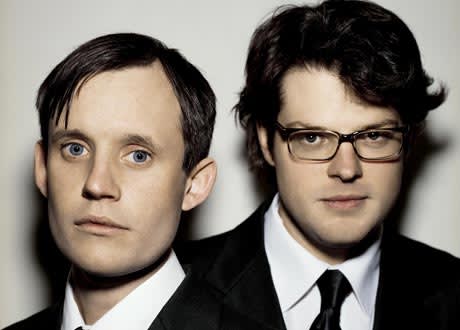Bringing humanitarian elements into the realms of electronic composition has been a goal since man and machine first met. On their debut album, Cash and Carry Songs, the French duo of Francois Goujon and Benjamin Morando, otherwise known as Octet, make a damned fine job of melding blood and tissue with nuts and bolts by taking the emotional warmth of pop composition, slapping in the sexy grooves of a packed nightclub and programming them into their glitch servers. About half of the tracks on this outstanding album are uplifting soundscapes, along the same lines as something one could expect from Four Tet, but the rest would be smash hits in a perfect world. The instantly captivating opener "Hey Bonus, adds a melted-down harpsichord romp to a chopped-up vocal pattern before hitting the listener with its spine-tingling, Stereolab bass line and wide rhythmic backing. Likewise, "Feels Good to Give Up (featuring Torontos own Taylor Savvy) is a full-on, bumping, irony free grind track that would feel right at home next to anything by Beyonce or Chingy. Its successful departures like these that make Cash and Carry Songs such a sultry and consistently satisfying listen. And you dont need a degree in nanotechnology to appreciate it. (Plain Recordings, www.plainrecordings.com)
How has your style of music been received in your homeland? French people are not very good at rock and pop music. Air and Serge Gainsbourg are some exceptions, but audiences here are more interested in popular songs sung in French. So in France, our music has been well received by critics, but radios do not support us a lot because they think our kind of music is for a too small audience.
Your influences are broader than those of most glitch electronics artists. What makes you as interested in pop structures and arrangements as modern electronic sounds? The laptop is not an end in itself, just a means of widening the possibilities. We think there is often a lack of emotion in recent electronic music. That's why we just wanted to try something else; to compose some weird and emotional pop songs with computers because so many marvellous songs were already created with piano or guitar.
What exactly are Cash and Carry Songs? "Cash and carry" stores are these warehouses that store a multitude of products without attractive presentations. Composing music with a computer, you are also often lost with the hyper-choice of endless technical possibility, so initially, we just wanted to evoke the hyper-choice of the consumerist world. That's why on the cover we represent two small characters lost in a gigantic supermarket.
(Plain)How has your style of music been received in your homeland? French people are not very good at rock and pop music. Air and Serge Gainsbourg are some exceptions, but audiences here are more interested in popular songs sung in French. So in France, our music has been well received by critics, but radios do not support us a lot because they think our kind of music is for a too small audience.
Your influences are broader than those of most glitch electronics artists. What makes you as interested in pop structures and arrangements as modern electronic sounds? The laptop is not an end in itself, just a means of widening the possibilities. We think there is often a lack of emotion in recent electronic music. That's why we just wanted to try something else; to compose some weird and emotional pop songs with computers because so many marvellous songs were already created with piano or guitar.
What exactly are Cash and Carry Songs? "Cash and carry" stores are these warehouses that store a multitude of products without attractive presentations. Composing music with a computer, you are also often lost with the hyper-choice of endless technical possibility, so initially, we just wanted to evoke the hyper-choice of the consumerist world. That's why on the cover we represent two small characters lost in a gigantic supermarket.
